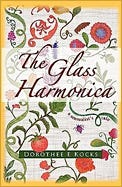In 1761, Benjamin Franklin invented the glass harmonica, a musical instrument that became notorious for the effect it produced in listeners. A series of glass bowls, graduated in size, were set to spinning with a foot pedal and played with wetted fingertips. Its tone lies in an unusual Hertz range at which the brain cannot easily locate the sound's source, probably the reason the music seems so ethereal: "celestial ravishment" in the words of poet Nathaniel Evans. Its most prominent players were women, making the instrument all the more scandalous.
The fictional Chjara is a free-spirited, sensual Corsican woman sent against her will to post-Revolutionary Paris to become an elderly invalid's servant. There, dressed in her master's embroidered waistcoat to pass as a young man, Chjara meets a widowed duchess who delights in the mildly shocking act of befriending her. The duchess introduces her to an American man whose Puritanical father has sent him to Paris on business. Away from his father's supervision, Henry kicks off the traces to explore erotic art and literature: what would become known by the not-yet-invented word "pornography." Henry and Chjara come together with a charge resembling another new discovery of Benjamin Franklin's: electricity.
Soon Chjara is playing the duchess's new instrument, she and Henry are pining for each other, and America looms on the horizon with its untutored masses yearning for sensual gratification even as they condemn it. Chjara's innocent mind is not so divided. "What if we are God's musical instruments?" she wonders, a sentiment that matures as she gains experience: "We please him when we allow the world to make us ring, when we are kindled with aliveness."
The novel, too, is most alive when most sensual, its characters kindled by music and the pleasures of love. (2011; 344 pages, including a Bibliographic Note separating fact from fiction)




